- Home
- Janice Kay Johnson
All the Lost Little Horses (A Desperation Creek Novel Book 2)
All the Lost Little Horses (A Desperation Creek Novel Book 2) Read online
ALL THE LOST LITTLE HORSES
A Desperation Creek Novel
By Janice Kay Johnson
ISBN-13: 978-0-9976638-6-0
All the Lost Little Horses
Copyright 2018 Janice Kay Johnson
All Rights Reserved
Cover Design by Tammy Seidick
This book is a work of fiction. All names, characters, locations and incidents are products of the author’s imagination, or have been used fictitiously. Any resemblance to actual persons living or dead, locales, or events is entirely coincidental.
License Notes
This e-book is licensed for your personal enjoyment only. The e-book may not be re-sold or given away to other people. If you would like to share this book with another person, please purchase an additional copy for each recipient. If you’re reading this book and did not purchase it, or it was not purchased for your use only, then please return to an online retailer and purchase your own copy. Thank you for respecting the hard work of this author.
TABLE OF CONTENTS
PROLOGUE
CHAPTER ONE
CHAPTER TWO
CHAPTER THREE
CHAPTER FOUR
CHAPTER FIVE
CHAPTER SIX
CHAPTER SEVEN
CHAPTER EIGHT
CHAPTER NINE
CHAPTER TEN
CHAPTER ELEVEN
CHAPTER TWELVE
CHAPTER THIRTEEN
CHAPTER FOURTEEN
CHAPTER FIFTEEN
CHAPTER SIXTEEN
CHAPTER SEVENTEEN
CHAPTER EIGHTEEN
CHAPTER NINETEEN
CHAPTER TWENTY
CHAPTER TWENTY-ONE
CHAPTER TWENTY-TWO
CHAPTER TWENTY-THREE
CHAPTER TWENTY-FOUR
About The Author
A Note from the Author:
HOME DEADLY HOME (A Desperation Creek Novel, Book 1)
PROLOGUE
The rat-a-tat-tat of nails slamming home into the sheet of plywood prevented him from hearing anyone approaching. At the tap on his shoulder, he spun around, the cordless nail gun held like a pistol.
“Whoa!” Bud Coffey raised his hands and backed away. “Boss wants to see you.” He smirked. “Right now.”
He wanted to flatten the smug little bastard’s nose, or ‘accidentally’ let a few nails fly. He did neither, only nodded a tight-lipped acknowledgement.
Just so the men on site would know he didn’t jump the second the bitch summoned him, he finished laying the plywood floor in what would be a living room before he jumped down to the ground and plugged the nail gun in to charge while he was at the trailer that housed the contractor’s office. Only then did he walk the half block to where it was parked.
His boss was alone inside. Sharon Jarvis. Fortyish, big tits, big ass, roll around her middle. Going to seed, although she tried to pretend it wasn’t happening by dyeing her hair platinum blonde and slabbing on the makeup. Her eyelashes were thick spikes. She looked like a hooker who had to beg for customers.
The men who’d worked for her father hadn’t seen much of her until Russ Jarvis keeled over from a heart attack. Looking pleased as punch, she’d pretended to wipe away a tear or two before taking his place. There wasn’t a man here who liked taking orders from a woman, and especially not from her, but he’d gritted his teeth and done it so far.
Now he said, “You wanted to see me?”
“Fifteen minutes ago.”
“I finish what I start.”
She pushed her father’s chair back and rose to her feet, holding his gaze. “Not here. Not anymore. You’re fired. Collect your things and get off the property. We’ll mail your check.”
Jolted, he exclaimed, “What? I’m a good worker.”
“My father warned you.” The bitch sounded condescending. Her lip had an insulting curl to it. “Another incident of domestic violence, you’d be gone. We don’t want someone with a hair-trigger temper around here.”
Then maybe she shouldn’t have tromped on his trip-wire.
He didn’t give her a chance to back away, to reach for a phone. He lunged over the desk and closed his hands around her throat before she could scream. She fought, but ineffectually. With his knee planted on the desk, the other booted foot on the floor, he had complete control. He squeezed and squeezed as her face turned red and then blue, as specks of blood appeared in her eyes, as her struggles became weaker. He kept squeezing after he knew she was dead, giving her a hard shake just because he could. And then he dropped her body like the trash she was.
He took a minute to search drawers and the file cabinet, finding a stash of a few thousand dollars that he pocketed. Finally, he pushed the little button to lock the only door into the trailer and left, closing the door behind him.
The rush of pleasure had him looking forward to going home. Two bitches a day, that would be a record. He’d have to take off, of course; that little creep Coffey would be eager to tell the cops who had gone into the trailer last.
But that was okay. He knew who to blame for everything: the reason he was pissed all the time, for being demoted from construction supervisor to foreman, and now fired. And yeah, the reason he’d gotten involved with the airhead who hadn’t known how to convince the cops who’d knocked on the door last night that the screaming had been from the TV, not her.
It was past time he took care of his real problem.
CHAPTER ONE
“Hadn’t branded the calves yet.” Walt Whitney, a tall, lanky rancher, stared straight ahead, his face set in grim lines. “We planned to do it next week. Son of a gun. These bastards chose the prime time to make a move on my herd.”
Detective Jed Dawson relaxed in the saddle as the two horses loped across the open pasture. He had a feeling of unreality even though he’d been a cop long enough to know that just about anything could be stolen. Still, this was a first for him, though he’d spent a few years on a ranch in Georgia.
Cattle rustling. Whitney’s call had been the second report within the last ten days, besides. Jed hadn’t known there was such a thing anymore. In his mind, cattle rustling was classic Old West. Six-shooters, the local sheriff deputizing a bunch of locals to corner the bad guys in a box canyon. The cattle thieves hung, vigilante style.
Turned out he’d been wrong, because here he was, pursuing what he was beginning to think might be a bigger problem than the tip of the iceberg they’d seen so far. Of course, he had an excuse for his ignorance. With his faint southern accent betraying him, anyone would know he wasn’t a native Oregonian.
This morning, Whitney had discovered something like twenty-five cows along with their calves missing from their pasture, a fence having been cut to allow the herd to be moved out onto the federal land that stretched for miles beyond the ranch. Where they’d been taken from there…well, that would be Jed’s job to find out, along with how they’d been transported.
A lot of people in this rural county on the east side of the mountains ran some cattle, but not many still made a living at it. Whitney was one of those few, his operation at least the equal of the Circle S next door. Jed knew the Circle S all too well after investigating the murder of the owner only a few months back. In fact, the two men now rode parallel to a fence that divided Whitney’s land from the ranch still owned by Curt Steagall’s widow. From what Jed had heard, she hadn’t yet decided whether to sell out or not. Her husband had been the third-generation to work that land, and rumor had it that the baby she was expecting was a boy.
He thought she’d have to sell. She didn’t
have the experience to run the place herself, and paying for too much help would eat up any profits, and then some. Besides, with corporations swallowing the smaller, family-owned operations, by the time that baby grew up, what were the odds a man could still make a living for his family with the Circle S?
After a brooding silence Jed hadn’t broken, Whitney said, “Beef prices are up this year, you know.” White-haired, he had the tanned, wrinkled face you’d expect from a man who’d spent a good part of his fifty-six years on earth outdoors beneath a baking summer sun or in bitter cold during the winter and spring. The lines carving his face suggested his expression was most often affable, but he wasn’t smiling today. “Should be good news, but for those of us who’ve been hit, the best prices in the world won’t make up for what we’ve lost.”
Jed had learned that although the calves were worth at least $600 each even in a so-so year, they weren’t the big loss. It was the cows, who turned out a calf or two a year. They were the working machinery of a cattle ranch, in a sense, and expensive to replace. What’s more, Whitney had put a lot of money into shifting his herd to Wagyu from the Herefords he’s formerly raised. Kobe beef was in high demand right now, and the stolen animals included his first Wagyu calves and some mighty expensive cows. Unfortunately, the rancher had cut expenses to the extent he could to finance the shift. He’d dropped his insurance.
As they rode, from long habit Jed scanned the landscape ceaselessly, watching for movement, for anything out of place. So far, all he’d seen was sagebrush and more sagebrush, one fleeing jackrabbit, board and wire fences, and cattle, including some red-brown Hereford steers on Circle S land.
“I went online last week,” he said, “after the first report of rustling. Suppose you heard about that.”
Whitney nodded. “The Harper spread.” Like every other rancher in the county, he’d heard within hours of the discovery of missing cattle. If he hadn’t, he’d have read about it in the Hayes County Courier, the weekly newspaper owned and run by the sheriff’s fiancée, Cassie Ward.
“Read about the problems ranchers had down in Malheur County a few years back,” Jed continued.
Whitney grunted, scowling beneath the brim of his hat. “Yeah, the sheriff’s department and a coalition of locals and federal agencies did a good job shutting it down, but they never really made arrests. These sons-of-bitches hardly ever get caught.”
Jed reined in his borrowed gelding to wait while Whitney leaned over to unlock the padlock on a gate that opened into a back pasture. Once they’d passed through, he left the lock and chain dangling.
“Shouldn’t have to lock every gate and door,” he grumbled. “Not in these parts. Didn’t do a damn bit of good, anyway.”
“You can’t keep an eye on your herd twenty-four seven.”
The rancher’s mouth thinned. “I don’t have a big enough operation for that.”
“You checked with any of your neighbors?” Jed asked.
“Ted Coughlin, to the north.” He jerked his head that way. “He had all his cows and calves in close to the barn. He was going to do a count anyway, but he thought he was all right. The Circle S…” He hesitated. “I don’t know that fellow Karen hired to manage the place. Have to wonder why she didn’t find a local to run it for her.”
Having dealt with a number of the local men who might have the experience needed but be available for a job like that because their own spreads were too small or too poorly run to turn a profit, Jed could see why the widow might have looked farther afield. Or maybe he was just a cynic.
“If you were hit, chances are good they were, too,” he pointed out.
“Yeah, I’ll talk to them.”
“I may stop there when I’m done here,” Jed said. Not might; would. Jed understood Walt Whitney’s suspicion. The new manager and hands next door had been in a prime position to case his operation and know when and how to make off with some pricey beef on the hoof.
Jed was offended to think of someone stealing from a woman still reeling from the trauma of discovering her husband’s body. It had been damned ugly. The sight had hit even Jed hard, given his own history.
He was able to shake off the memory for now, but he hadn’t slept well since a disgraced military sniper turned serial killer had taken out five people in a matter of weeks this winter. What Jed had seen and done reawakened nightmares he’d deluded himself had been laid to rest.
Live and learn.
Five minutes later, he and Whitney reached the back fence that had been cut not ten feet from a locked gate that opened onto federal land, where Whitney paid to graze his cattle during the summer and early fall. Jed noted that no electric wire topped the fence, one measure that could be effective.
He swung down from the gelding and dropped the reins, then walked a careful grid pattern to study the trampled ground leading through the gap between fence posts. It would have been nice to spot something one of the rustlers had dropped – say, a pack of cigarettes with fingerprints on it. He didn’t see a damn thing. Not even a boot print, or so much as a print of a distinctive horseshoe.
“The Harpers had already turned their herd out on the range,” he commented.
Whitney grunted his disapproval, which Jed understood even though he hadn’t been in Oregon a year yet. The native bunchgrasses were still fragile in May. The more ecologically responsible ranchers in the area protected the land by not turning out cattle until June or July.
Jed continued, “Meant I didn’t have a trail like this to follow.”
“You want me to come along?”
He shook his head. “No need. Not like I’m going to come up on the gang and have a shootout. They’re long gone.”
Whitney mumbled something profane.
“I’ll stop by the house on my way back,” he added.
The older man nodded. “Thanks for coming out. I won’t lock the gates.”
By the time Jed had led his borrowed bay gelding through the gap in the fence and remounted, Whitney was riding away. Jed tightened his legs, but kept the pace at a slow trot so he wouldn’t miss anything. The twenty-foot wide trail left by the cloven hooves of the stolen cattle headed deeper into federal land, topping a rise where the first scraggly junipers made an appearance among the gray-green sagebrush and rabbitbrush, both ubiquitous in this high desert landscape.
He wasn’t surprised when, about a mile farther along, he came to a much wider trampled area…and broad tire tracks. Dismounting again, Jed walked around, able to tell from the imprints in the ground that a temporary corral had been set up to hold the herd. His guess from the multiple tire tracks was that a pickup truck and stock trailer had been utilized to move the stolen animals from here. If there’d been only the one truck and trailer, the rustlers would have had to take two or three trips. Maybe more, given that they’d also need to break down the corral and take it at the end, too, as well as loading their horses. If so, Whitney’s cows and calves couldn’t have been moved any great distance. Chances were good they were still somewhere within the county.
Jed wanted casts of these tire impressions. Given that varying soil compositions, temperatures or types of impressions called for different methods, that took an expert, which he wasn’t. He took out his mobile phone and called his boss, Sheriff Grant Holcomb.
When Grant answered, Jed told him what he’d observed so far, and asked that the young deputy who’d recently received training be sent out to do the job. Like every other small, rural county, they were lucky enough to be able to call on the Oregon state crime scene investigators, as they had during this winter’s investigation of multiple murders, but Grant had also been working at upgrading sheriff’s department capabilities. A newly hired deputy, Erin Brown, had been eager to take classes and handle as much as possible of the CSI tasks. She had a leg up, since she’d been a chemistry major in college before deciding after graduation to go into law enforcement.
As he rode on, Jed thought some about the new deputy, hired to replace a slacker Gran
t had fired.
He didn’t know her well yet, but just hiring Erin Brown had stirred things up around here. She was the first woman ever to work law enforcement in Hayes County, sheriff’s department or Fort Halleck P.D. Jed was bemused by the attitude. Rural Georgia leaned to the conservative side, but he’d left his boyhood behind a long time ago. Plenty of women served in the army these days. Even the army Rangers, although not while he was still in.
He glanced up. The day was pleasant, with this being May. Not hot yet, but the broad arch of sky was a rich blue softened by a few thin white clouds. He kept catching aromatic whiffs of sagebrush, and noxious ones when the horse brushed rabbitbrush. To the west lay the low, crumbling remnants of an ancient basalt rimrock, a feature that reappeared throughout the county. With continued erosion, this one might disappear altogether in the next century or so. Not long past it, he got a first, distant glimpse of a straight, two lane country road with a yellow line painted down the middle.
Sure enough, that’s where the tracks led him, disappearing when they met the pavement. With the weather having been dry, he couldn’t tell which way that truck pulling a stock trailer full of stolen cattle had turned.
He had seen enough tracks during his ride to feel sure that the same pickup had come and gone through this back country several times. All last night? Or would several other ranchers in the same vicinity be reporting missing stock in the next few days? Knocking on doors would be his next task. He made a mental note, too, to contact sheriff’s departments in surrounding counties, find out if the same trouble was cropping up elsewhere.
Following the road would make for a shorter trip back, but Jed decided against it. He had no idea how the gelding would react to traffic bearing down fast on them. Besides, with the sun getting higher in the sky, the light would have changed once he turned around. He might see something he’d missed.

 Home Deadly Home
Home Deadly Home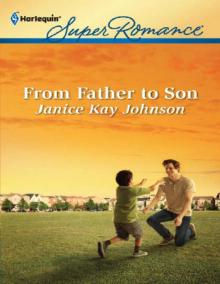 From Father to Son
From Father to Son All the Lost Little Horses (A Desperation Creek Novel Book 2)
All the Lost Little Horses (A Desperation Creek Novel Book 2)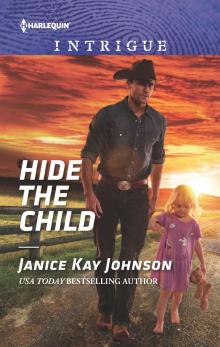 Hide the Child
Hide the Child Within Range
Within Range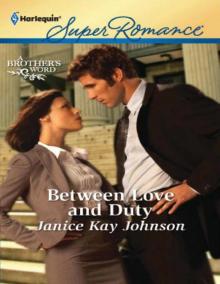 Between Love and Duty
Between Love and Duty First Comes Baby
First Comes Baby Charlotte's Homecoming
Charlotte's Homecoming In A Heartbeat (HQR Superromance)
In A Heartbeat (HQR Superromance) The Call of Bravery
The Call of Bravery In Hope's Shadow
In Hope's Shadow Anything for Her
Anything for Her Harlequin Superromance September 2014 - Bundle 1 of 2: This Good ManPromises Under the Peach TreeHusband by Choice
Harlequin Superromance September 2014 - Bundle 1 of 2: This Good ManPromises Under the Peach TreeHusband by Choice The Baby Agenda
The Baby Agenda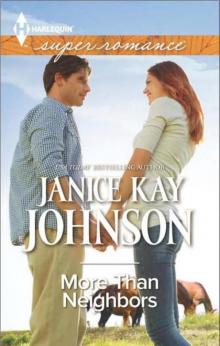 More Than Neighbors
More Than Neighbors Her Amish Protectors
Her Amish Protectors All That Remains
All That Remains Whisper of Revenge (A Cape Trouble Novel Book 4)
Whisper of Revenge (A Cape Trouble Novel Book 4) In a Heartbeat
In a Heartbeat A Mother's Claim
A Mother's Claim Because of a Girl
Because of a Girl Back Against the Wall
Back Against the Wall Dangerous Waters
Dangerous Waters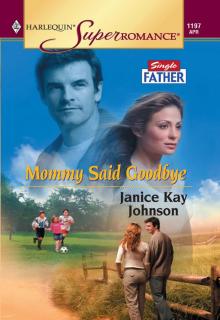 Mommy Said Goodbye
Mommy Said Goodbye A Mother's Secret
A Mother's Secret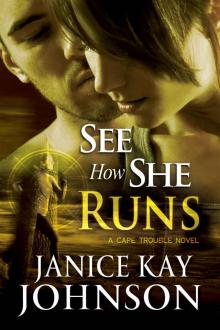 See How She Runs (A Cape Trouble Novel Book 2)
See How She Runs (A Cape Trouble Novel Book 2) Plain Refuge
Plain Refuge Bringing Maddie Home
Bringing Maddie Home For the Girls' Sake
For the Girls' Sake Through the Sheriff's Eyes
Through the Sheriff's Eyes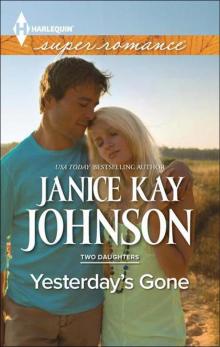 Yesterday's Gone (Two Daughters Book 1)
Yesterday's Gone (Two Daughters Book 1) All a Man Is
All a Man Is Harlequin Superromance January 2014 - Bundle 1 of 2: Everywhere She GoesA Promise for the BabyThat Summer at the Shore
Harlequin Superromance January 2014 - Bundle 1 of 2: Everywhere She GoesA Promise for the BabyThat Summer at the Shore No Matter What
No Matter What Wakefield College 01 - Where It May Lead
Wakefield College 01 - Where It May Lead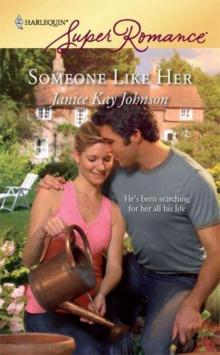 Someone Like Her
Someone Like Her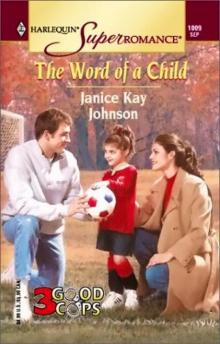 THE WORD OF A CHILD
THE WORD OF A CHILD Harlequin Superromance May 2016 Box Set
Harlequin Superromance May 2016 Box Set Open Secret
Open Secret The New Man
The New Man Finding Her Dad
Finding Her Dad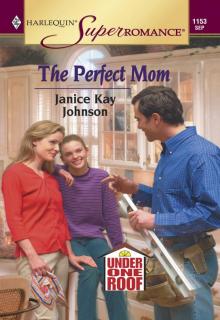 The Perfect Mom
The Perfect Mom All Through The House
All Through The House Match Made in Court
Match Made in Court Making Her Way Home
Making Her Way Home From This Day On
From This Day On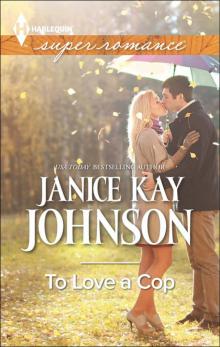 To Love a Cop
To Love a Cop The Hero's Redemption
The Hero's Redemption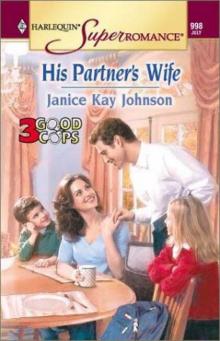 HIS PARTNER'S WIFE
HIS PARTNER'S WIFE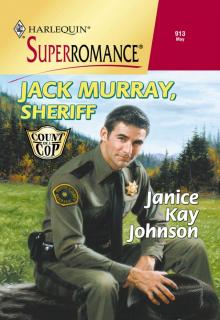 Jack Murray, Sheriff
Jack Murray, Sheriff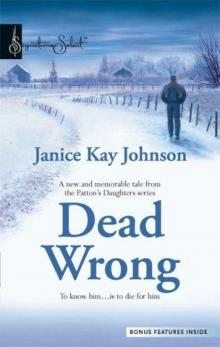 Dead Wrong
Dead Wrong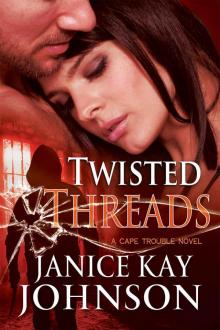 Twisted Threads (A Cape Trouble Novel Book 3)
Twisted Threads (A Cape Trouble Novel Book 3)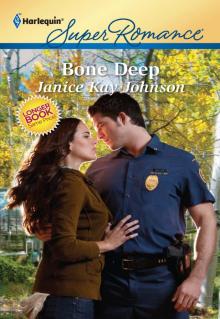 Bone Deep
Bone Deep The Closer He Gets
The Closer He Gets With Child
With Child Whose Baby?
Whose Baby? Kids by Christmas
Kids by Christmas